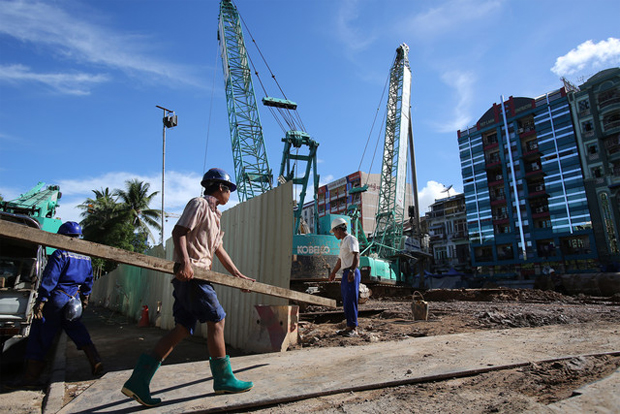For years, international companies wanting to set up in Myanmar were stifled by Western sanctions or rebuffed by the country's military government.
Now, as the country opens up, global corporations are finding a new hurdle: real-estate prices.
Top-quality office space in prime locations in Yangon, the commercial capital of the poorest country in Southeast Asia, is now the most expensive in the region at $78 a square meter ($7.33 a square foot) per month, according to research from real-estate firm Colliers International. By comparison, office rentals in a booming market like Jakarta are $24 a square meter. Even in Manhattan, the average asking rent is lower, at $49.95.
Serviced apartments and condominiums remain in short supply, pushing up costs for new expatriates and businesses, with additional units still a few years away. A client of Myanmar Deals Leasing recently toured three apartments before lunch, only to learn that all were taken by other interested parties by the end of that same day, according to the real-estate firm, which specializes in high-grade properties for businesses and diplomats.
Peter Witton, an expatriate in Yangon who works as a director at investment and advisory firm Anthem Asia, has spent recent days searching for a new apartment. He says one- or two-bedroom flats in poorly built buildings that include business space and, in some cases, schools are going for about $1,800 a month, three times what they would have cost a year ago.
"It is a bit depressing when you start looking around and seeing what's available," Mr. Witton says.
And the worst isn't over, property analysts say.
"We expect prices to go up even more, as foreign direct investment goes up and the investment climate improves," says Tony Picon, managing director at Colliers International in Myanmar.
With decent living and working spaces in such short supply, some of these professionals are less inclined to move their families to the market, a stumbling block for companies working on large-scale infrastructure or other projects.
Even for some companies operating in sectors that are slated to expand significantly in coming years—Myanmar boasts the fastest-growing tourism market in Southeast Asia—the cost of starting up remains unjustifiable.
Small luxury hotels aren't feasible at the moment because the property prices are too high, says Paul Kerr, chief executive of the U.K.-based hotel brand Small Luxury Hotels of the World, a group that includes about 520 hotels in more than 80 countries. "[Land owners] are dreaming about the amount they can make," he says.
Mr. Kerr's concerns are echoed by many American businesses already operating in Southeast Asia. Of the more than 470 American business leaders in the region, polled in a U.S. Chamber of Commerce survey published in August, 86% said they were dissatisfied with the high cost of rentals and apartments in the country and 79% said office rentals remain a major concern for their companies in Myanmar.
Still, not everyone is complaining. Investors are benefiting as the country's fledgling real-estate industry builds high-rises in markets where typically the tallest structures are still golden pagodas.
Many of these investors are wealthy Myanmar citizens who have few places to park their cash in the absence of a stable banking system, stock exchange or bond market. Increasingly, they are turning to real estate, pushing up land prices and thus rentals for foreign companies and expatriates. Foreigners are unable to buy land directly in Myanmar so they are limited to developing it through a joint-venture partnership with a Burmese developer.
"There's going to be a shortage of supply for many years to come," says Andrew Rickards, chief executive officer of Yoma Strategic Holdings Z59.SG +1.91% .
Mr. Rickards says that Yoma—a Singapore-listed investment firm with interests including real estate, construction and agriculture—is part of Myanmar businessman Serge Pun's empire. Yoma stock is trading at more than 80 times future earnings, and has doubled since the same period last year.
Yoma and other Myanmar firms are betting that growth will be fueled by the foreign companies that have taken a long-term view of the potentially lucrative market of 60 million. These include U.S. firms General Electric Co. GE +1.28% and Coca-Cola Co., KO -0.18% telecommunication operators like Norway's Telenor TEL.OS +0.30% ASA and Qatar's Ooredoo, ORDS.DO +0.28% and London-based bank Standard Chartered STAN.LN +1.34% PLC, all of which have established operations in Myanmar over the past year.
In the U.S. Chamber of Commerce survey, 49% of American businesses in Southeast Asia say they plan to expand in Myanmar, despite complaints about high costs and other infrastructure hurdles. Frits van Paasschen , chief executive officer of Starwood Hotels & Resorts HOT -0.03% —whose hotel brands include St. Regis, W and the Westin—says the company was planning to establish a presence in Myanmar.
"Rising land prices and a construction infrastructure that is still in its early stages would make building a world-class hotel a challenge, but will make the prize that much greater when the hotel is open," he says.
Yoma hopes to address the supply issues with new mega-developments, including the 10 million-square-foot Star City residential project in Thanlyin, northeast of downtown Yangon. Aimed at middle-class city residents, the development, slated for completion in early 2016, will be linked to downtown Yangon by ferry, and by road to the Japanese-led Thilawa special economic zone.
|
















